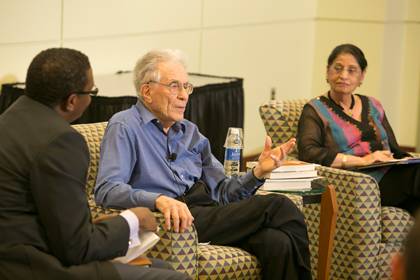Jack Preiss on Passing the Baton on Civil Rights Activism
Civil rights activist and sociology professor emeritus Jack Preiss shares his experience helping the university integrate

Of all the classroom experiences in Jack Preiss' long and distinguished career as an educator and civil rights activist, he remembers the students who were enrolled in his sociology summer school course at the North Carolina College for Negroes (now called North Carolina Central University) in August 1959, shortly after Preiss arrived in Durham.
"I came into that class of nine students with what I thought was a pretty reasonable introductory course," Preiss said. "What I soon realized was that all but two of my students were illiterate. And they would be teaching in public schools in a few years. That's when I realized things in this town and on (Duke's) campus needed to change."
Read MorePreiss shared this and many other anecdotes from his tenure as an administrator and educator at Duke, NCCU and the Durham City Council during last Thursday's "Our Voices: A Special 50th Anniversary Commemorative Evening," held at the Nicholas Auditorium in the School of Nursing. The Q&A session was organized by the Office of Institutional Equity (OIE) and co-moderated by Paul James, OIE's director of diversity, equity and inclusion, and Inderdeep Chatrath, OIE's director of affirmative action and equal opportunity.
James said Preiss' experiences as a sociology professor on campus during the '60s, '70s and '80s would add a fresh perspective to the 50th Anniversary Commemoration, which concludes the weekend of Oct. 4-6.
"This was a chance to bring to life Dr. Preiss' story as a witness to and active player in the integration of Duke," James said. "He's like a walking library. He has shared with us some stories that just aren't necessarily in the history books."
After his experience at NCCU, Preiss wasted no time laying the groundwork for Duke's eventual reversal of its discriminatory campus practices. He helped found the Academic Council in the late 1960s, one of the few campus groups to stand up to the Board of Trustees' inequitable policies. When Preiss wasn't busy encouraging faculty and students to fight for equality on campus, he served on the Durham City Council from 1965 to 1969 and later worked to provide access to equitable housing to all members of the Durham community.
Although Preiss reflected on his time at Duke in the civil rights age, he was careful not to spend too much time "reminiscing."
"I'm fortunate that I've been able to change a few things," Preiss said. "And that's what's important, focusing on what you're able to change and not worrying about everything that is still wrong with the world."
"But I don't consider myself an icon of this period or these issues. I'm just one of the people who are interested in where we need to go from here."
For Preiss, the next steps involve remaining vigilant against what he called "policies that are setting us back," referring to the July reversal of the North Carolina Racial Justice Act and the new voter identification laws. He urged members of the audience not to spend all their time celebrating the progress of the last half century but instead monitor and combat policies and elected officials who "are trying to undo our hard-won gains."
"I'm near the end of my life now," Preiss said. "But most of you are going to be here for quite a while. It's up to you to decide what the work of the past 50 years will amount to."
"You're part of the picture now. What are you going to do about it?"
For a list of upcoming 50th Anniversary Commemoration events, visit spotlight.duke.edu/50years.